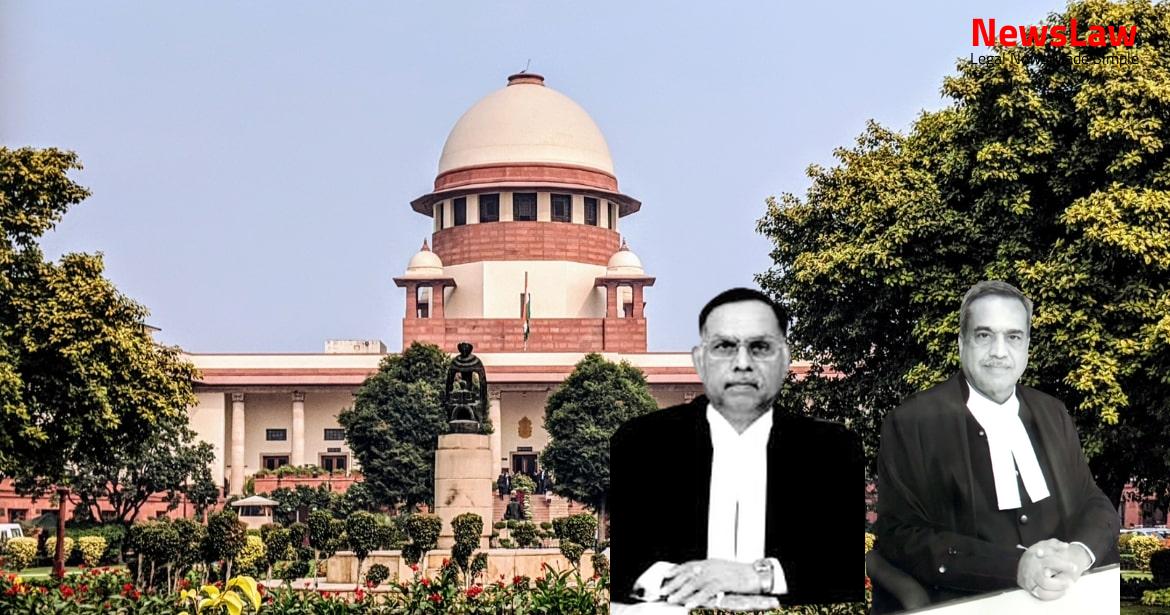In a significant legal case, the Supreme Court has delivered a judgment in the matter involving sustained ad-hoc appointment, specifically between Nem Singh and the Deputy Director of Education. The ruling sheds light on the complexities surrounding ad-hoc appointments and sets a precedent for future cases. Let’s delve deeper into the details of this case and its implications.
Facts
- The Deputy Director of Education stated on 30 June 1997 that Nem Singh did not make contact with the school to take over the charge.
- The selected candidate did not join the post, leading to the appellant remaining in service.
- The State alleged collusion between the appellant and the management to prevent the selected candidate from joining.
- The appellant filed a writ petition seeking to be treated as a permanent appointment and for salary release in April 1996.
- A direction was given on 13 August 2018 to pay the appellant his salary for the period worked.
- The appellant continued to be employed in the post as per the directions received.
- On 30 June 1994, the management tried to absorb the appellant into a substantive vacancy created by the death of the appointed candidate.
- The appellant was appointed as an ad-hoc Lecturer in English on 11 August 1993, which later became a permanent vacancy due to the incumbent’s death on 1 October 1993.
- The Special Appeal was dismissed by the Division Bench on 30 October 2017.
- An interim order in favor of the appellant was granted during the pendency of the Special Appeal, similar to one given earlier on 16 April 1996 by the Single Judge.
- Nem Singh was appointed by the U.P. on 30 June 1997.
- The Division Bench held that the appellant was appointed in a leave vacancy under the Second Removal of Difficulties Order 1981.
- The salary paid until the date of the judgment will not be recovered, but the appellant will not receive further emoluments.
- A letter dated 14 July 1994 mentioned the disapproval of the appellant’s appointment due to non-conformity with relevant provisions.
- The High Court stated that without approval from the competent authority, any further direction for the appellant’s continuation or salary payment is not lawful.
Also Read: National Task Force for Healthcare Safety: Ensuring Dignity and Protection for Medical Professionals
Arguments
- The appellant has continued to be in service since 1993 under interim orders of the High Court.
- As the senior-most teacher, the management submitted a proposal for the appellant to continue as an in-charge principal.
- No proper procedure was followed in making a regular appointment as per the settled law in Pramila Mishra v Deputy Director of Education.
- The ad-hoc appointment ended with the short-term vacancy upon the death of the incumbent.
- The DIOS claimed disapproval of the appellant’s services through a letter dated 14 July 1994, which the appellant disputes.
- The appellant had no vested right to claim a regular appointment or to continue in service.
- There was no obligation on the part of the respondent to provide a regular appointment to the appellant.
Also Read: Railway Compensation Case: Supreme Court Judgment
Analysis
- The management proposed to post the appellant as an in-charge Principal.
- The appellant’s salary payment was directed during the proceedings.
- The DIOS rejected the application to absorb the appellant to a substantive post 24 years ago.
- The appellant was appointed ad hoc in a leave vacancy without following proper procedure.
- The leave vacancy ceased to exist upon the death of the regularly appointed candidate.
- The appellant had no right to claim conversion of his ad-hoc appointment to a substantive one.
- The purported appointment of the appellant to a substantive post was without DIOS approval.
- Nem Singh, appointed lawfully in 1997, was allegedly prevented from joining his post.
- Issuance of a direction to fill up the post on a regular basis within four months
- Method adopted by the appellant and management deemed unsustainable in law
Also Read: Scheduled Castes Reservations: Sub-Classification Dispute
Decision
- The appellant is allowed to continue on an ad-hoc basis until a regularly appointed candidate is selected.
- The appellant’s salary should be paid for the period of work until a regular candidate is appointed.
- No costs are to be paid by either party.
- The management can still pursue their representation to the competent authority for consideration.
- Any pending applications are disposed of.
Case Title: RAMAN SINGH Vs. DISTRICT INSPECTOR OF SCHOOLS
Case Number: C.A. No.-005265-005265 / 2019



